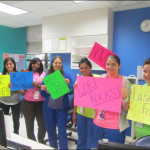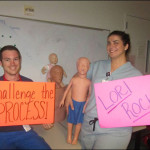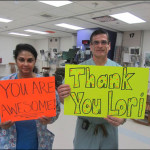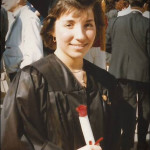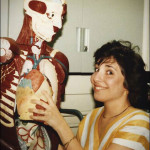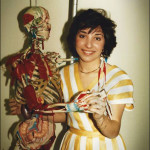
For Chief Nursing Officer Lori Armstrong the NICU is a special place. It’s where she began her career 29 years ago and where she learned the skills she now uses as a leader for the nursing team of nearly 2,500. Armstrong, who joined Texas Children’s a little more than two years ago, has already changed the face of nursing here through the reinvention of the nursing staff, advocating for more front-line managers, a reinvigorated system for retention and nurse development as well as more full time positions to focus on patient and family-centered care and improve outcomes. Her hard work and dedication was recently highlighted as she accepted the Dr. Jennifer L. Howse Award for Excellence in NICU Leadership at the annual NICU Leadership Forum in Florida.
“I am honored to have even been considered worthy of this nomination,” said Armstrong. “To be selected is overwhelming, humbling and the greatest honor of my career.
The Dr. Jennifer L. Howse Award for Excellence in NICU Leadership is dedicated to the president of the March of Dimes Foundation whose leadership and vision have helped promote research, programs and partnerships that benefit the health of babies in the NICU. Each year the award is given to a recipient who has demonstrated the vision and courage of a strong leader, has wielded significant influence within and beyond the NICU walls and leads with care and compassion for patients, families, colleagues and staff. Armstrong’s nomination letters came from three colleagues both here and outside of Texas Children’s who shared their personal letters about what Armstrong’s enthusiasm and leadership has meant.
 “Lori’s passion for neonatal care, leadership, and the profession of nursing make her the perfect applicant for this award,” said Shannon Holland, a former NICU leader. “Her enthusiasm for excellent family centered care and passion for continuous learning and growth are inspirational.”
“Lori’s passion for neonatal care, leadership, and the profession of nursing make her the perfect applicant for this award,” said Shannon Holland, a former NICU leader. “Her enthusiasm for excellent family centered care and passion for continuous learning and growth are inspirational.”
The award recipient is judged on three characteristics which are highlighted by Dr. Howse including Leader Sight, Leader Care and Leader Courage. For Armstrong, each of those areas is an important part of the nursing leadership here at Texas Children’s. Armstrong explains Leader sight as the tremendous responsibility of leaders whose sight and vision for nursing galvanizes the staff, the leadership team and the physician partners which ultimately impacts the health of babies. Leader care is something she learned from a former patient family.
“A parent once told me of his amazing definition of nurses,” said Armstrong. “He defined nurses as people who care and then care some more.”
Armstrong’s definition of courage is about finding your voice and the ability to use it when caring for patients who are too small to speak, too sick to speak and too scared to speak.
Her biggest message to not only the nursing leaders but her entire nursing staff is about their contribution to the organization and the lives of the children that are cared for here.
“I want them to know that there is an inseparable link between your sight, your care and your courage and the outcomes of the tiny infants in your care.”
Howse Excellence in NICU Leadership Award




